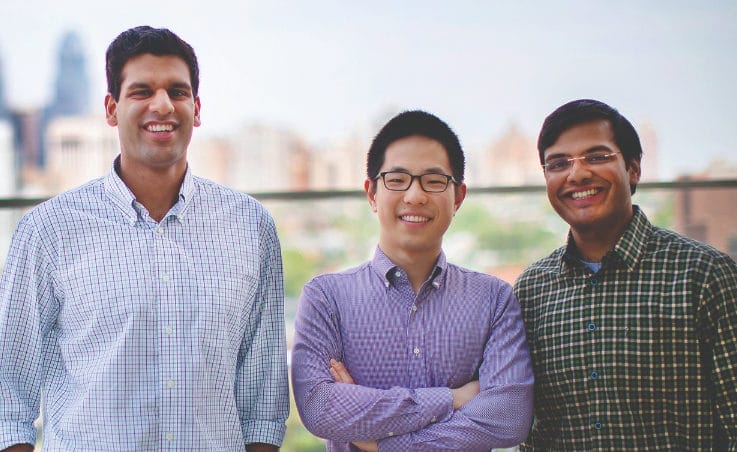MD Ally
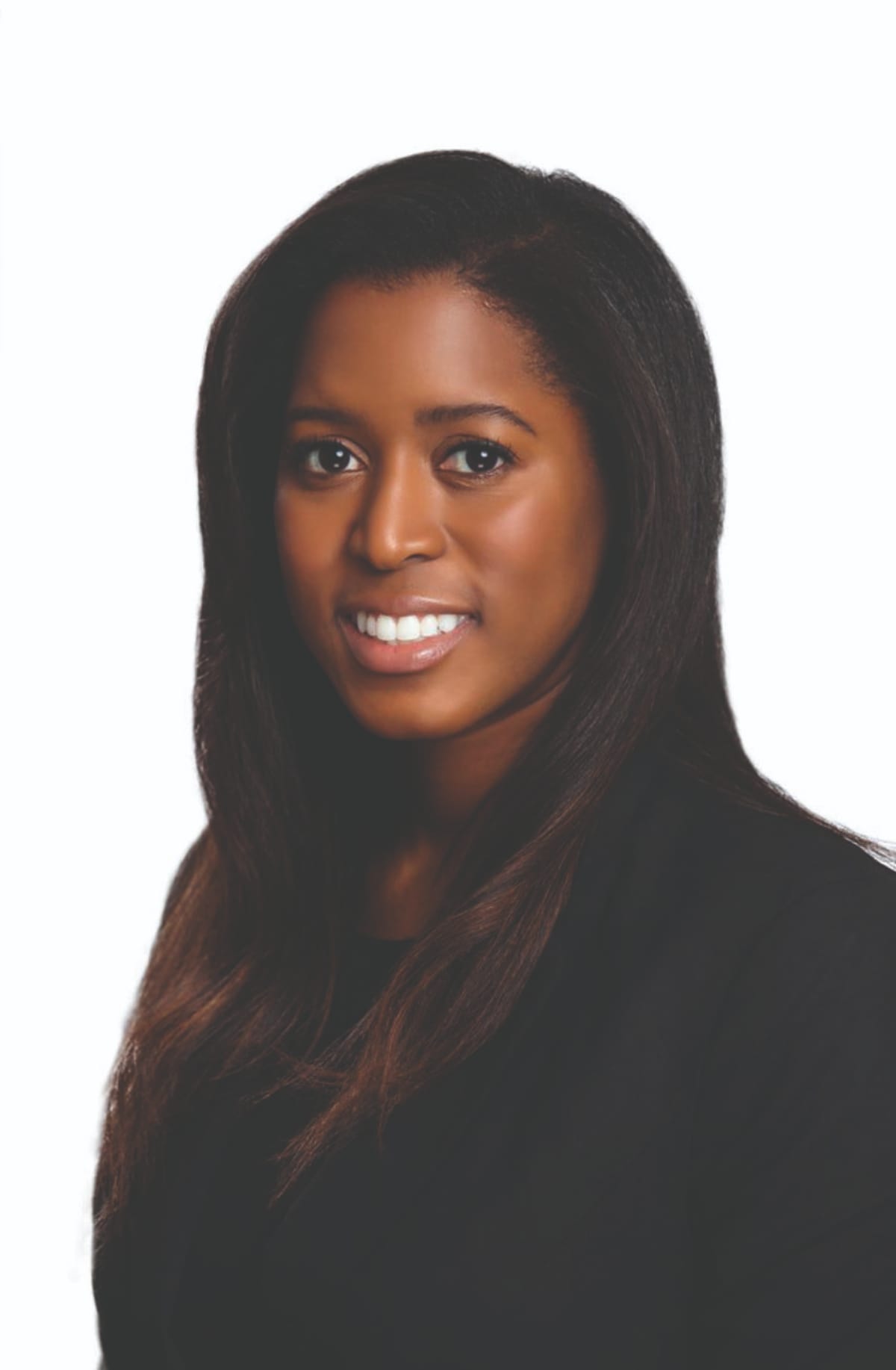
Shanel Fields WG19
Two hundred and eighty-eight billion dollars—that’s how much non-urgent 911 calls and emergency-room visits cost each year. So how can health-care providers minimize costs and maximize resources without sacrificing patient care? Enter MD Ally, a non-emergency 911 solution. Founded by Shanel Fields WG19, MD Ally integrates new technologies into the regular 911 flow to identify and reroute non-emergency callers. MD Ally provides immediate medical guidance, alternative transportation, and scheduling services, allowing providers to focus their resources on critical cases. This means better—and cheaper—care all around.
Modern Meadow
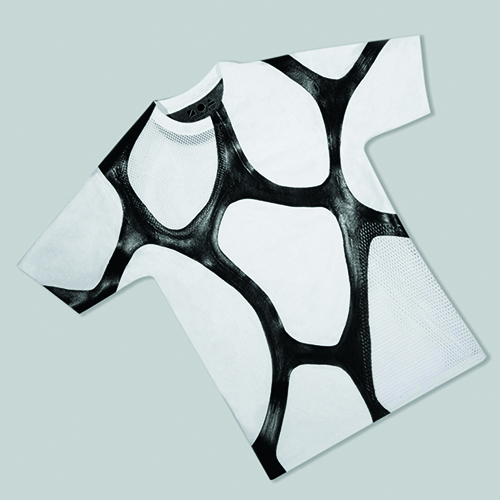
(Photograph by Sara Kinney)
The Age of Biofabrication is here, and with it, the future of the fashion industry is looking a whole lot different. Leading the charge is Andras Forgacs WG05, CEO and co-founder of Modern Meadow, the tech pioneer behind the world’s first bioleather. Leather’s main biological ingredient, collagen, has long been sourced from animals, but thanks to biotechnology, these building blocks can now be grown in the lab. Although bioleather is still in product development, it’s already in a category by itself: “We can play in areas that traditional leather couldn’t play in,” Forgacs explained earlier this year, “because we remove the constraints of size, shape, and how you manufacture with it.”
GlimpzIt

(Illustrations by Cynthia Kittler)
Can machines be trained to understand humans on a deep level? That’s what software developers Sami Kaipa WG12 and Parry Bedi WG12 explored when they co-founded San Francisco-based GlimpzIt in 2014. The platform gathers qualitative, unstructured data (think: pictures, video, text) and taps into consumer emotions. These human insights, or “glimpzes,” are then provided to companies from Hallmark to Johnson & Johnson, so they can utilize machine learning to fine-tune messaging or other marketing campaigns. Example: NBC used GlimpzIt’s creative artificial intelligence to analyze The Voice viewers and increase fan loyalty (and direct-sponsorship revenue). As for GlimpzIt’s own forecast, it’s looking pretty bright; its technology was acquired by Forrester research and advisory firm—one of the world’s largest—over the summer.
Auvere
One takeaway that Steven Feldman W84 learned in more than two decades as a Goldman exec was the importance of a diversified portfolio. While some people collect art or fancy cars, Feldman believes in another asset: investment jewelry. Auvere—a play on the gold symbol “AU” and the Italian word avere, which means to have or to own—designs and sells modern earrings, rings, and necklaces made from 22-karat or 24-karat gold. (Feldman is no stranger to luxury brands; his other company, Peryton, specializes in fine leather goods.) Unlike gold bars, these are a part of your portfolio that you can actually wear. Another bonus? Auvere’s high-karat pieces are hardy and can sustain regular wear without damaging your ROI.
Aaptiv
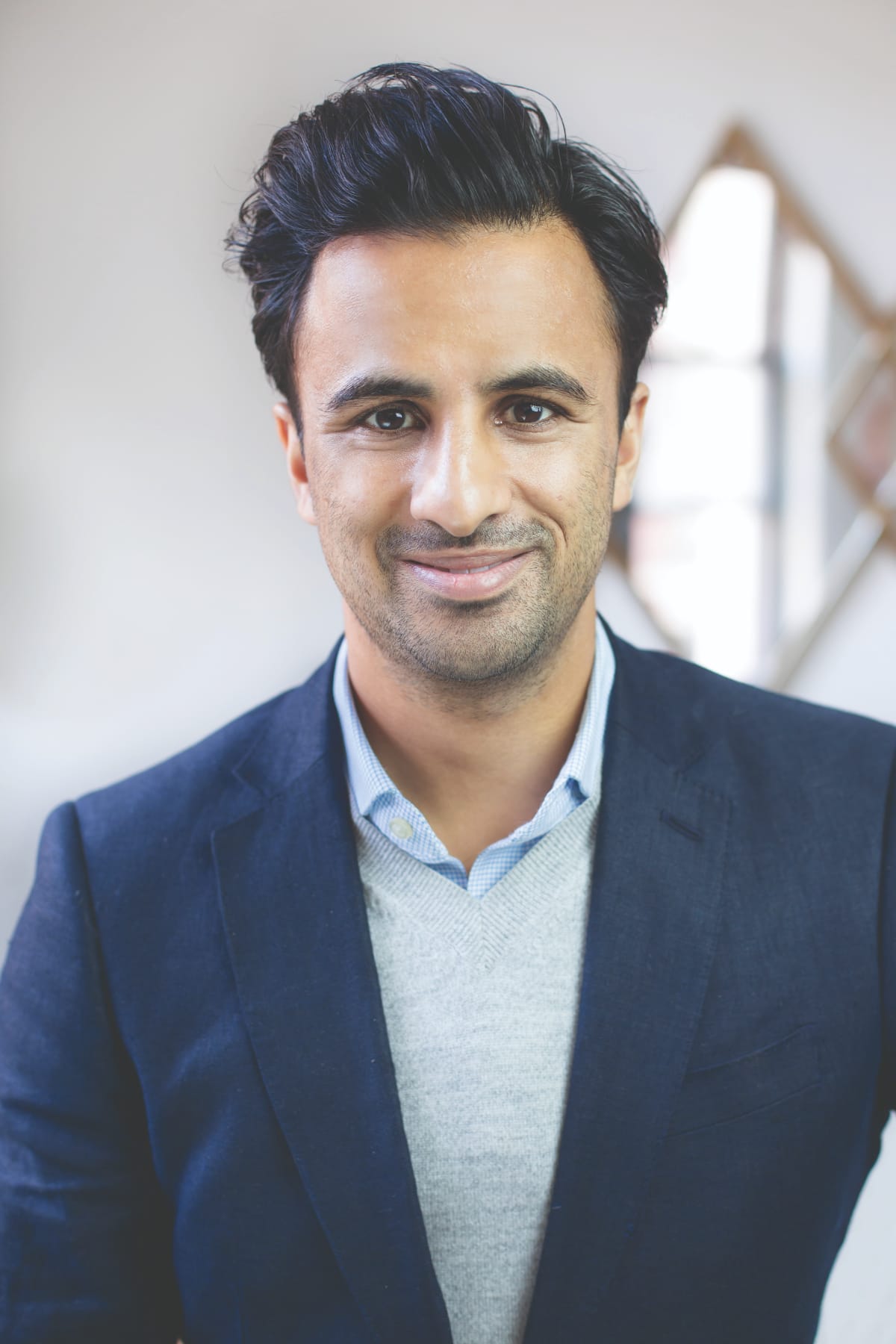
Ethan Agarwal WG11
We’ve all been there: trying to juggle a fitness regime with everything else life throws at us. That’s where Aaptiv, founded by Ethan Agarwal WG11, can help. An audio-centric fitness subscription app, Aaptiv synchronizes voice recordings of personal trainers with curated playlists, providing users with a boutique fitness-studio experience right from their smartphones and at a fraction of the price. Aaptiv covers 12 different categories and all fitness levels; with access to thousands of workouts on the app, users can choose anything from a morning run to an afternoon meditation to an evening cycle.
Chippin Snacks

Haley Russell WG18 and Laura Colagrande GAR18 GFA18
We love our fur babies: Nearly half of U.S. households include a dog in the family, and in 2017 alone, Americans spent more than $29 billion on pet food. And there’s an increasing demand from pet parents for sustainably sourced, healthy snacks for their beloved pups. Food and beverage executive Haley Russell WG18—whose résumé includes running a vertical cricket farm—tapped into the insect protein “superfood” trend for a solution. She consulted vets on pet nutrition and collaborated with Penn psychology professor Paul Rozin, who researches cultural attitudes around food, to understand and expand consumers’ growing interest in eating bugs. Russell and Laura Colagrande GAR18 GFA18 pitched in Penn’s 2018 iDesign competition, and the Chippin team won with its first product: a peanut, cricket, and pumpkin snack.
RainmakerForce

Mukund Sundaram WG11
It’s no accident that RainmakerForce is in the business of, well, making it rain for salespeople and the places where they work. Mukund “Mack” Sundaram WG11, president and CEO of the sales tech company, suggests that selling should be smart—as opposed to subjective—and rely less on CRM and more on data. In other words, analytics and data science can be used to track buyer behaviors and build a viable pipeline of potential customers. The ultimate goal? Eliminate some of the guesswork when it comes to areas like recouping lost revenue or accelerating new opportunities, which ultimately means more cha-ching for companies big and small.
Mineful
 Fresh from their much-lauded sale of alternative student-financing company Paytronage, Connor Swofford W16 and Zach Pelka W17 have again set their sights on transforming the way we pay. With B2B cryptomining startup Mineful, they’re helping “freemium” desktop app publishers monetize free-tier users. In lieu of credit cards, app users can unlock paid services and content by sharing their idle computing power, which Mineful plugs into its distributed cryptomining operation. Participating app publishers integrate Mineful with a simple API and receive a cut of the cryptomining profits in USD—profits that were generated with app users’ power. The company, which counts fintech entrepreneur Michael Taormina WG15 among its mentors, has set an ambitious goal: to become as ubiquitous as PayPal.
Fresh from their much-lauded sale of alternative student-financing company Paytronage, Connor Swofford W16 and Zach Pelka W17 have again set their sights on transforming the way we pay. With B2B cryptomining startup Mineful, they’re helping “freemium” desktop app publishers monetize free-tier users. In lieu of credit cards, app users can unlock paid services and content by sharing their idle computing power, which Mineful plugs into its distributed cryptomining operation. Participating app publishers integrate Mineful with a simple API and receive a cut of the cryptomining profits in USD—profits that were generated with app users’ power. The company, which counts fintech entrepreneur Michael Taormina WG15 among its mentors, has set an ambitious goal: to become as ubiquitous as PayPal.
Sanguis
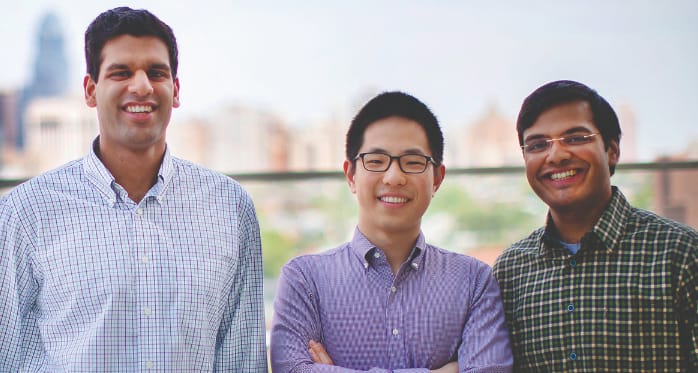
Prateek Agarwal M20 WG20, Daniel Zhang GR23 M23, and Divyansh Agarwal GR23 M23
Each year, an estimated 15,000 cancer patients in the United States alone die from infections and other complications while undergoing chemotherapy. To solve this lethal but all too common problem, Prateek Agarwal M20 WG20, Divyansh Agarwal GR23 M23, and Daniel Zhang GR23 M23 created Sanguis—the world’s first handheld, inexpensive blood-cell counting device. Winner of the 2018 Penn Wharton Startup Challenge, Sanguis uses just a few drops of blood to measure neutrophils, the body’s primary infection-fighting cells. The result? Patients can monitor their health and detect life-threatening conditions from home, potentially saving thousands of lives every year.
Elevar Sports
 For all the ways that sporting equipment has been reimagined over the years—goodbye, heavy hockey sticks and wooden drivers—there’s still room for evolution in the 16th-century-designed cricket bat. Which is exactly why cricket fanatic Aayush Tapuriah WG17 used science and technology to reengineer the bat with an aerodynamic blade, a super-cushiony grip, and an ergonomic handle. As for the material, league rules mandate that it be wood, so only top-notch willow wedges are inspected and handpicked. The result is a custom Elevar Sports bat designed for control, power, and just the right amount of vibration for the modern cricketer.
For all the ways that sporting equipment has been reimagined over the years—goodbye, heavy hockey sticks and wooden drivers—there’s still room for evolution in the 16th-century-designed cricket bat. Which is exactly why cricket fanatic Aayush Tapuriah WG17 used science and technology to reengineer the bat with an aerodynamic blade, a super-cushiony grip, and an ergonomic handle. As for the material, league rules mandate that it be wood, so only top-notch willow wedges are inspected and handpicked. The result is a custom Elevar Sports bat designed for control, power, and just the right amount of vibration for the modern cricketer.
US WorldMeds

Paul Breckinridge Jones WG83
Paul Breckinridge “Breck” Jones WG83, a self-described serial entrepreneur, left a successful real estate business in Louisville, Kentucky, to start a specialty pharma firm back in 2001. Since then, US WorldMeds has developed drugs for those who face challenging medical conditions, like Parkinson’s, and its latest drug is no exception. The medication, called Lucemyra, was approved and released in August to help fight the U.S. opioid epidemic; specifically, it’s the first (and only) non-opioid to treat and relieve withdrawal symptoms. Says Jones: “We are grateful for the urgency demonstrated by the FDA in rapidly reviewing and approving this important treatment.”
MarketSnacks
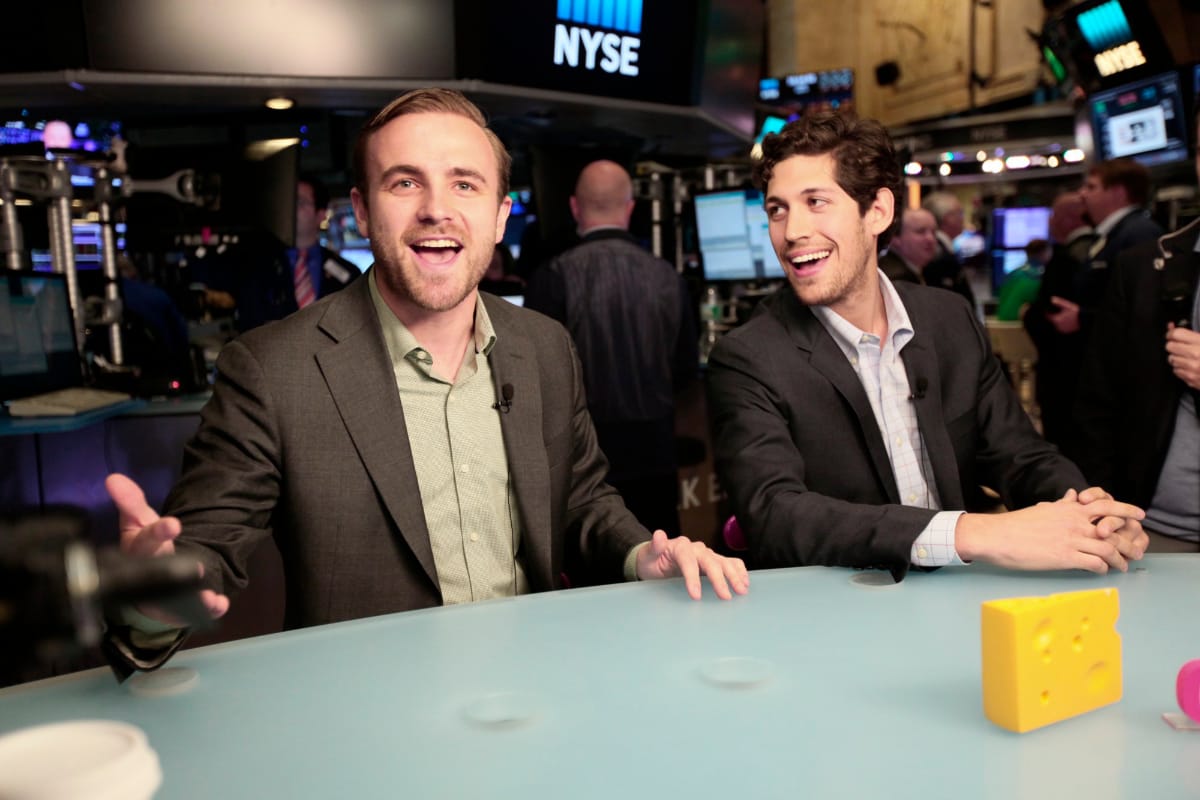
Jack Kramer and Nick Martell WG19
“Quick, clear, and tasty” is how MarketSnacks describes its daily podcast, on which co-founders (and former analysts) Nick Martell WG19 and Jack Kramer take interesting biz and tech headlines and break them down into 15-minute recaps. The friends haven’t missed a day of market news since 2011, when they started the daily blog and e-newsletter. Their stories may target millennials, but their demographics are broad, largely because they make Wall Street both entertaining and easy to understand. Look no further than a few podcast segments: “Walmart and Microsoft Become Power Couple,” “Tesla Got Sabotaged,” and “Crocs Is Our ‘Comeback of the Day.’” MarketSnacks was named as an Apple Podcast of the Week in July, and the guys cracked the Forbes “30 Under 30” this year.
Collecto

Federika Longinotti-Buitoni WG18
Federika Longinotti-Buitoni WG18 has compared her gifts-for-women website to “searching through a magazine.” Just pick a price point and category (i.e., home decor, fashion, food, travel, and beauty), and voilà—Collecto narrows down its online products to half a dozen or so just-right ideas. But the real value comes in the curated collection itself, which includes hard-to-find brands, whether they’re new or just have a very limited presence in the U.S. market. Thanks to its thoughtful presents in beautifully wrapped packaging, Longinotti-Buitoni notes, Collecto touches two customers with one transaction: both the buyer and the recipient.
VOHTE
 You registered to vote and went to the polls, but in the booth, you faced a dilemma: Who is on the ballot, and what do they stand for? Sean Danowski WG14 and Dafan Zhang G11 G12 L14 feel your citizen-pain. That’s why they founded VOHTE, an online platform that aims to change the way we exercise our democratic right. At Vohte.com, users can enter a home address to view the names of all the candidates on their ballot. For a fee, each candidate can create a verified public profile clickable from the ballot, share stories, and respond to news. VOHTE’s goal is to create a one-stop source for constituents to hear directly from politicians. The for-profit Pennsylvania B-Corp started out with a focus on that state’s 2018 primaries and plans to scale nationwide in time for the midterms.
You registered to vote and went to the polls, but in the booth, you faced a dilemma: Who is on the ballot, and what do they stand for? Sean Danowski WG14 and Dafan Zhang G11 G12 L14 feel your citizen-pain. That’s why they founded VOHTE, an online platform that aims to change the way we exercise our democratic right. At Vohte.com, users can enter a home address to view the names of all the candidates on their ballot. For a fee, each candidate can create a verified public profile clickable from the ballot, share stories, and respond to news. VOHTE’s goal is to create a one-stop source for constituents to hear directly from politicians. The for-profit Pennsylvania B-Corp started out with a focus on that state’s 2018 primaries and plans to scale nationwide in time for the midterms.
Published as “Cricket Bats, Bioleather, and a Bite-Size Wall Street Podcast” in the Fall/Winter 2018 issue of Wharton Magazine.
Read about other alumni-powered ventures in the full Watchlist.




















